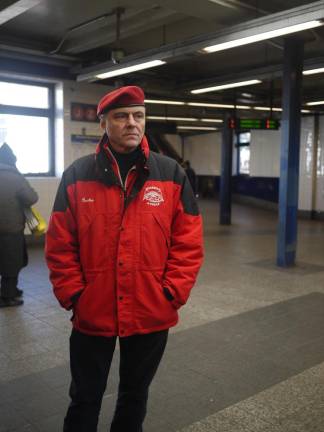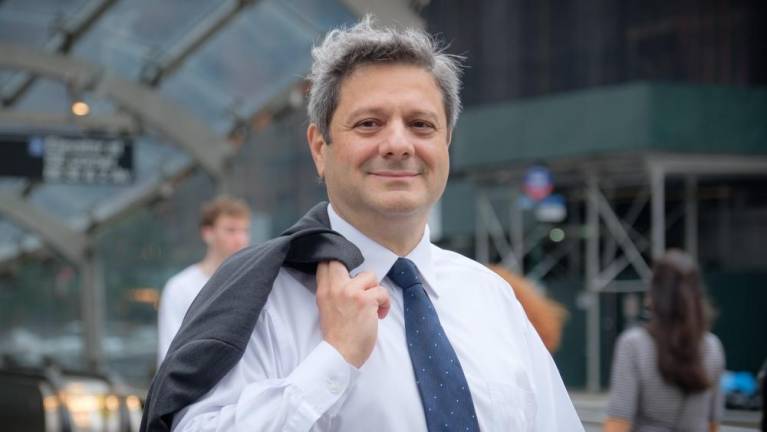A Debate Over the Guardian Angels
The Upper East Side responds to homelessness, crime and the role of patrols in the neighborhood
The decision of the Guardian Angels to start patrols on the Upper East Side has been the source of controversy since the group became a presence in the neighborhood in late September. Curtis Sliwa, who founded the Angels in 1979 as an unarmed crime prevention organization, had been asked to bring the organization to the area by Lou Puliafito, a lifelong resident of Yorkville who ran for State Assembly for New York’s 76th District.
As a doorman at the Kingsley, Puliafito noticed a changing atmosphere in the neighborhood on his night shifts. Although CompStat data from the NYPD’s 19th Precinct recorded a slight increase in burglaries and robberies in the past year, the sources of this change, as well as the presence of the Guardian Angels, have been the subject of debate in the neighborhood.
“The Guardian Angels are not welcome here,” said Patrick Bobilin, who ran as a progressive Democrat for the State Assembly, in a phone interview. “I asked Lou to keep them [the Guardian Angels] out of the neighborhood — they threaten our most vulnerable neighbors experiencing homelessness.” Bobilin organized a rally on October 15 on 86th and Lexington against the presence of the Guardian Angels.
After the Angels spent the summer on the Upper West Side, in response to issues surrounding the city’s decision to move homeless New Yorkers from shelters to hotels such as the Lucerne due to COVID-19, some are concerned that the Guardian Angels are on the UES to intimidate the homeless.
Currently only one hotel on the Upper East Side, the Bentley, was given a contract to house homeless residents. The site is being run by the Doe Fund, and the 306 New Yorkers now living at the Bentley make up 50% of the residents that were living before COVID in the nonprofit’s transitional residencies. “This isn’t the Upper West Side, this is one commercial hotel,” said Jennifer Blum, the senior vice president of administration at the Doe Fund. “We spent a lot of time listening to the concerns of the residents and they have diminished significantly since early May — we try to be good neighbors and reach out to locals.”
Sliwa pushes back against the critics. “Street crime has nothing to do with the homeless and mentally disturbed individuals — Patrick doesn’t know what we do,” Sliwa said in an interview. “We’re not like the cops, we befriend the homeless and give people the training and skill level they need to intervene nonviolently in situations.”
Puliafito was also adamant in stressing the lack of a connection between an increase in homeless New Yorkers and an uptick in crime in the Upper East Side: “These are two separate issues; the homeless need help and services. They’re here because they have no opportunities — let’s get them what they need.”
“False Narrative”
Part of the debate stems from an article published by the New York Post on October 13th entitled “Guardian Angels to Patrol UES Amid Increased Homeless ‘Warehousing,’ ” that sought to create a connection both between the increase in crime on the Upper East Side and the housing of people enrolled in the Doe Fund’s program at the Bentley, as well as the decision of the Angels to come to the neighborhood and the program at the Bentley. “That Post article was propelling a false narrative, most people on the Upper East Side don’t even know we’re there,” Blum said.
For the most part, residents of the Upper East Side have responded positively to the Doe Fund’s operations at the Bentley. “The article in the Post wasn’t accurate,” Judy Schneider, who runs the East Sixties Neighborhood Association with her husband Barry, said in a phone interview. The Post’s article claimed that complaints had been voiced in response to the Bentley by many Upper East Side civic associations, but according to the Schneiders, they weren’t contacted by Post reporters or the Guardian Angels and they didn’t know of any others who had.
“The folks at the Doe Fund have been very transparent and helpful, “ said Judy Schneider, who has been in contact with Blum. When asked if there was any connection between the Bentley and crime in the neighborhood, the Schneiders said any claims of a connection are part of the false narrative, and that other than one minor incident in the first two weeks, things have been running smoothly.
“Homelessness and crime problems on the Upper East Side are not connected to the Bentley — homelessness was not invented by the pandemic, it was accelerated by it,” Judy Schneider said.
Alida Camp, Chair of Community Board 8, speaking on her own behalf and not the Board, voiced similar sentiments: “We’ve been talking about an increase in crime in the area since last November. We want a safe neighborhood for every everyone and nothing is pointing to the homeless people at the Bentley, and even if it were, I’m not sure the Guardian Angels would be a proper response.” Camp cited the recent developments of high rise buildings pricing many residents out of the neighborhood as a potential source of an increase in homelessness.
The Angels’ Role
However, in a city beleaguered by a pandemic, Sliwa sees the Guardian Angels as the solution to both an increase in crime and an increase in homelessness. “Early on in the lockdown, the homeless and mentally disturbed were abandoned by nonprofit agencies who didn’t know how to deal with COVID,” he said. “The Guardian Angels stepped in and fed them and cleaned them and escorted them to get their medicine at hospitals.”
Bobilin and other UES residents like Brian Mangan, who helped organize the rally, doubt the ability of the Angels to help and fear they might criminalize the homeless. “The Guardian Angels are sensationalizing the crime increase — the Post went crazy with the stories,” Mangan said after the rally.
“They say they’re here for homeless services but how are they more equipped than some random person?” said Bobilin. “They’re here for physical intimidation towards the most vulnerable New Yorkers, who are threatening a ‘perceived quality of life.’”
But the Guardian Angels see their work as necessary at a time when they say the city’s agencies are failing the homeless and police are less “proactive” than reactive nowadays: “In the haste to defund the NYPD, the city defunded the NYPD’s homeless outreach unit — there’s a huge vacuum left there.” Sliwa also said that while the homeless may contribute to negative effects on the quality of life in the neighborhood, burglaries and subway sexual offenses handled by the group’s Perv Busters were not committed by the homeless.
Some people fear a perceived link between the Guardian Angels and the rise of right-wing militias, in particular after the violent incident involving the Proud Boys at Metropolitan Republican Club in October 2018. Sliwa was quick to deny any connection. “We’re not a political group. We don’t take sides, we’re there to keep the peace.” But Bobilin, who called the Angels a proto-militia group, was skeptical: “They’re asking for more criminalization of the poor when we need real compassionate solutions that provide help for people.”
But despite differing views on the Angels, Puliafito, Bobilin and Sliwa all seemed to be in agreement that the city has for the most part failed housing insecure New Yorkers during an unprecedented public health crisis. “We’re in the midst of four-tier pandemic: an eviction crisis, a social justice crisis, a health crisis and a poverty crisis all happening at once,” Bobilin said. “Crimes of survival will go up if elected officials fail to provide accurate support during these times and militia groups will fill the void.”
Puliafito also stressed a need to find permanent housing for the homeless, and support for people recently released from jail or police detention, and thinks the Guardian Angels can be a first step: “True New Yorkers need to step up to help the city. We’re all here for each other, none of us are here for ourselves. There’s no evidence that the Guardian Angels are harassing the homeless.”
So far, according to Sliwa, the Angels have recruited nine volunteers from the Upper East Side since the end of September who are undergoing training.
“Homelessness and crime problems on the Upper East Side are not connected to the Bentley — homelessness was not invented by the pandemic, it was accelerated by it.” Judy Schneider, East 60s Block Association

